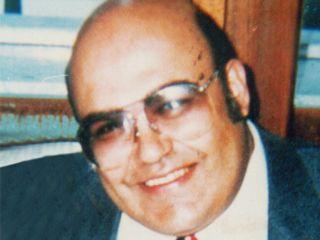Farag Fouda
Farag Fouda (August 20, 1945 - June 8, 1992) is an Egyptian writer and thinker, born in Zarqa, Damietta Governorate, Egypt. He was assassinated by the Islamic Group on June 8, 1992 in Cairo. He also had writings in the October magazine and the Egyptian newspaper Al-Ahrar.
Farag Fouda was born in the village of Zarqa near the city of Damietta on August 20, 1945. In the sixties, Farag Fouda joined the Faculty of Agriculture and obtained a BA in agricultural economics in June 1967 from Ain Shams University. In the same month, his brother, Lieutenant Muhyiddin Fouda, who was one year younger than him, was martyred in the June 5, 1967 war, just three days after graduating from the Military Academy, and his body was not found. Farag Fouda participated in the angry student demonstrations in 1968 and was arrested for several days during the era of President Gamal Abdel Nasser.
He participated in founding the New Wafd Party, then resigned from it, due to its refusal to ally the party with the Muslim Brotherhood to run in the Egyptian People's Assembly elections in 1984. He then tried to establish a party called the "Future Party" and was waiting for approval from the Parties Affairs Committee of the Egyptian Shura Council. He founded the Egyptian Association for Enlightenment on Asmaa Fahmy Street in Nasr City, in front of which he was assassinated.
The writings of Dr. Faraj Fouda was widely debated among intellectuals, thinkers and clerics, and opinions differed about her. He demanded the separation of religion from politics and the state and not from society. The Front of Al-Azhar Scholars was launching a major attack on him, and the Committee on Parties Affairs demanded that his party not be licensed. In 1992, that front issued a statement in Al-Nour newspaper in which he declared his infidelity.
Farag Fouda worked as a teaching assistant at the Faculty of Agriculture at Ain Shams University, and obtained a master’s degree in agricultural economics in 1975, then a doctorate in agricultural economics from Ain Shams University in December 1981, and the title of his thesis was: “The economics of rationalizing the use of irrigation water in Egypt.” He worked as a teacher at the University of Baghdad in Iraq, then as an economist in some international think tanks, then founded the "Fuda Consulting Group" specialized in project evaluation studies.
Fouda was planning to work in university teaching, but the political turmoil in that period, and the growth of Islamic groups during the seventies, which ended with the assassination of President Muhammad Anwar Sadat on October 6, 1981 at the internal level, and the victory of the Islamic Revolution in Iran in 1979 on the external level, brought him out. From the university teaching profession to public political work. Although he continued to emphasize the impact of academic study on his writing style and intellectual approach.
In general, Sadat's economic policies agreed with the scientific approach of Farag Fouda, who believed in the superiority of liberal regimes, as "the comprehensive planning that controls supply and demand was a pure absurdity or a turning point in history." He praised the positive effects of the openness policy on the Egyptian economy.
Faraj Fouda wrote a number of books during that period, which are "Before the Fall" (1984), "The Hidden Truth" (1984), "The Played Ones" (1985), and "Where To Sectarianism?" (1985) with Younan Labib Rizk (1933-2008) and Khalil Abdel Karim (1930-2007), and "A Dialogue on Secularism" (1987). The books received attention, and some of them were printed more than once, and some of them were studied in universities and institutes.
He also wrote a number of articles in opposition newspapers, such as "Al-Ahali" of the National Progressive Unionist Party and "Al-Ahrar" of the Liberal Socialist Party, and a smaller number in national newspapers, in which he fought many intellectual battles in defense of the principles of the civil state, such as secularism, national unity and rights.
List of his books
The hidden truth.
temporary marriage.
Dialogues about Sharia.
Where is sectarianism?
Fiddled.
to be or not to be.
delegation and the future.
So it is not a word in the air.
Prognostic.
terrorism.
Dialogue on Secularism.
before falling.
On June 8, days before Eid al-Adha, two young men from the Islamic group, Ashraf Saeed Ibrahim and Abdel Shafi Ahmed Ramadan, waited on a motorcycle in front of the (Egyptian Association for Enlightenment) on Asmaa Fahmy Street in Heliopolis, where Farag Fouda's office is. At half past six in the evening, when he was leaving the association with his son Ahmed and a friend, and while they were going to get into Faraj Fouda's car, Ashraf Ibrahim got off his motorcycle and Abdel Shafi Ramadan fired bullets from a machine gun, severely wounding Faraj Fouda in the liver and intestines, while his friend and son sustained injuries. slight, and set off on the run. However, the driver of Faraj Fouda's car ran behind them and hit the motorcycle and dropped it before trying to escape to a side street. Abdel Shafi Ramadan fell and hit his head on the ground and lost consciousness, so the driver and a police officer who was on the scene carried him to the hospital, where the police arrested him. As for Ashraf Ibrahim, he managed to escape.
An ambulance carried Faraj Fouda to the hospital, where he said as he was dying, "God knows that I have done nothing but for the sake of my country." Cardiac surgeon Dr. Hamdi El-Sayed, the captain of the Doctors Syndicate, saved Faraj Fouda's life for six hours, after which he breathed his last. He also carried his son to the hospital, where he recovered from his injuries.









0 Comments